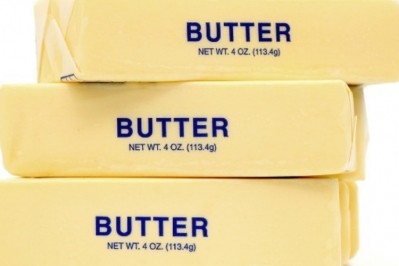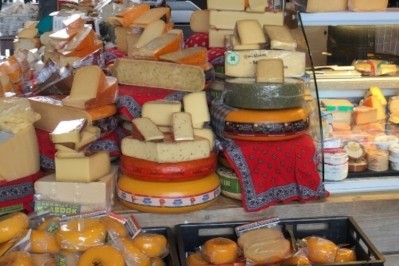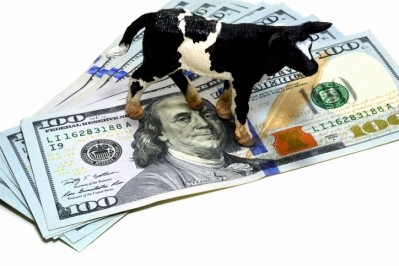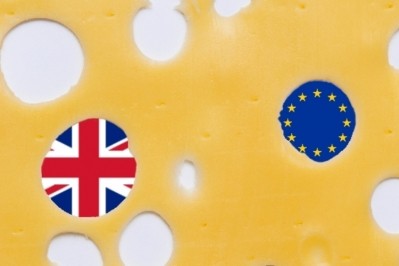Dairy UK and NFU hit out at UK no-deal tariff review
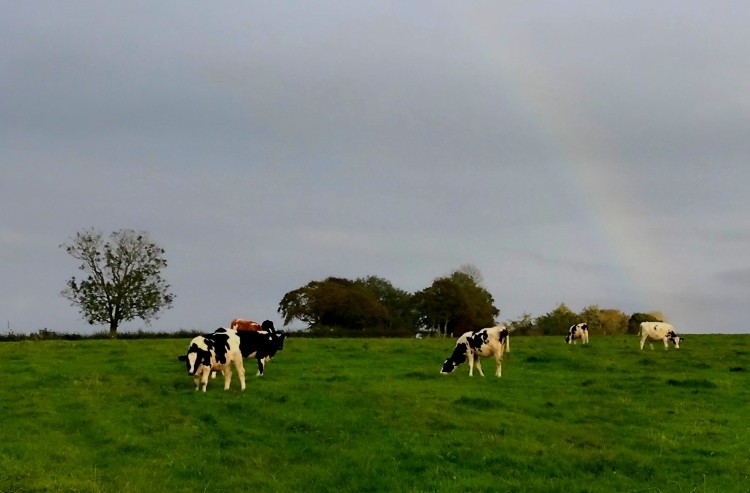
Dairy UK responded to the temporary tariff schedule being set before Parliament, saying it does not do enough to recognize the real and imminent danger of a no deal Brexit to the British dairy sector.
Currently, a large majority of the UK’s dairy exports go to the EU market but in the event of a no-deal Brexit scenario, the EU would impose WTO tariffs on these products. Dairy UK said these tariffs are ‘cripplingly high’ and would make British dairy products uncompetitive on the EU market.
It said that this would result in 150,000 tonnes of cheese and 33,000 tonnes of butter being unable to enter the EU market as it does currently, becoming displaced, flooding the UK market and creating the potential for huge farmgate price collapses. Across all products, the industry would see nearly £1.3bn in lost export potential to its most profitable market.
The dairy organization said that even though Government has committed to placing tariffs on selected in-bound dairy products, these tariffs will not be on all dairy foods and will be too low to offer British processors a level playing field.
As a result, Dairy UK warns, dairy businesses will lose their EU markets, whilst products from the EU will continue to come into the country, subject to little or no tariffs. In addition, countries outside the EU will now also be able to access the UK market, with a potentially much lower standard of product.
Dairy UK said that if a deal is not possible the Government must put reciprocal tariffs in place to protect the industry, or it will have to commit to provide financial support to farmers to protect them from potential price collapses short term, and think about what measures businesses might need to help them in facing an uncertain trading future.
Chief executive of Dairy UK Dr Judith Bryans said, “As the 31st of October gets closer and closer we need this Government to make a deal. This is not about the politics of remaining or leaving, it’s about the uncertainty, instability and disaster a no-deal Brexit would lay at the doors of an industry which helps feed this country and contributes to its economy.
“We have repeatedly voiced our concerns over a no deal scenario to the Government as well as our concerns about this liberal tariff regimen, which does not go anywhere near far enough to ensure the survival of the industry. It’s time for the Government to start listening. We need fast and effective action now to protect the dairy industry and in particular British cheese, otherwise we’ll see some of our world class dairy products, businesses, and farmers fail.”
Bryans added, “Our preference is a deal! One which allows us to have open frictionless trade with our largest export customer, the EU. If that doesn’t happen the Government needs to impose reciprocal tariffs to level the playing field and put in place a package of mitigation measures, before businesses are pushed to the wall.”
NFU weighs in
NFU president Minette Batters said the government has severely undermined the British farming industry by confirming it will remove the tariff safeguards for a number of key agricultural sectors in the event of a no-deal Brexit, including grains, eggs, fruit and vegetables and a number of dairy products.
The NFU agreed that a no-deal scenario risks the UK being flooded with imports produced to lower standards that would be illegal for UK farmers.
Batters said, “I wrote to the Prime Minister only a few weeks ago to express our concerns with the approach the government took back in March to import tariffs in a no-deal scenario. But with the chances of us leaving in less than four weeks without a deal increasing by the day, the Prime Minister has missed a real opportunity to back British farmers.
“Farmers and growers are understandably anxious to know that the government will take all steps necessary to help the sector avoid the worst impacts of leaving the EU without a deal. Instead we will see – from day one – farm businesses facing new, high tariffs on much of the 60% of our exports that go into the EU, while tariffs on goods coming into the UK will be set far, far lower and in many cases won’t be applied at all. In particular, British egg farmers, British cereal farmers, our horticultural growers and many of our dairy farmers will have zero protection against cheap imports coming in from around the world.”
Batters said there is a danger of opening up the UK to imported food that would be illegal to be produced in the UK, produced at a lower cost because it may fail to meet the environmental and animal welfare standards legally required of UK farmers.
“Not only could this be terrible news for farmers, whose very businesses will be under threat, but also for consumers who enjoy the high-quality and affordable British food they produce,” Batters added.
“Farmers are going to feel betrayed by this government’s failure to act now in making sure that all that can be done is being done to help mitigate the damaging effects of a no-deal Brexit. I don’t recall anyone selling a vision of post-Brexit Britain as one involving lower standard food filling shop shelves while British farmers, the guardians of our cherished countryside, go out of business.”
